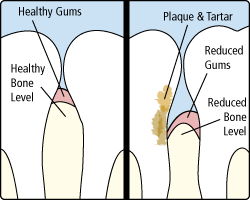
Gum disease or periodontal disease is an infection of the gums and bone surrounding your teeth. It is one of the top reasons for tooth loss in adults and one of the largest contributors to “whole body” problems such as heart disease, stroke, and blood sugar disturbances (diabetic issues). It ranges from mild (gingivitis that has progressed to early gum and bone loss) to severe (periodontitis that destroys bone and gum, causing loss of teeth and systemic health concerns).
At Meuselbach Family Dental, Dr. Meuselbach and our team consider ourselves copartners in treating our patients with gum disease. Our goal is to find practical ways to help halt the disease progression before it changes overall health, confidence, and smiles!
What causes gum disease?
Generally, the cause of gum disease is the colonization of harmful bacteria because of a lack of proper oral hygiene; i.e. not flossing and brushing properly. There are additional factors, such as genetics, smoking/dipping, immune system and response, bite habits, certain medications, and developmental concerns (crooked teeth or malformed teeth) that may contribute to the development of gum disease as well.
Gum Disease Symptoms
Gum disease is often untreated because it is rarely symptomatic until its progression is severe. Contact our West Chester dental office if you notice any of these symptoms:
- Gums that bleed easily
- Red, swollen, tender gums
- Gums that have pulled away from the teeth
- Persistent bad breath or bad taste
- Pus between your teeth and gums
- Permanent teeth that are loose or separating
- Any change in the way your teeth fit together when you bite
- Any change in the fit of partial dentures
Treating Gum Disease
In order to treat gum disease, Dr. Meuselbach and our team recommend deep cleanings such as scaling and root planing, more frequent hygiene visits (every three to four months) at our West Chester dental office, and ideal home care with brushing, flossing, and/or using a Waterpik. Advanced periodontal disease is generally not completely reversible, but can be maintained to keep from progressing.

